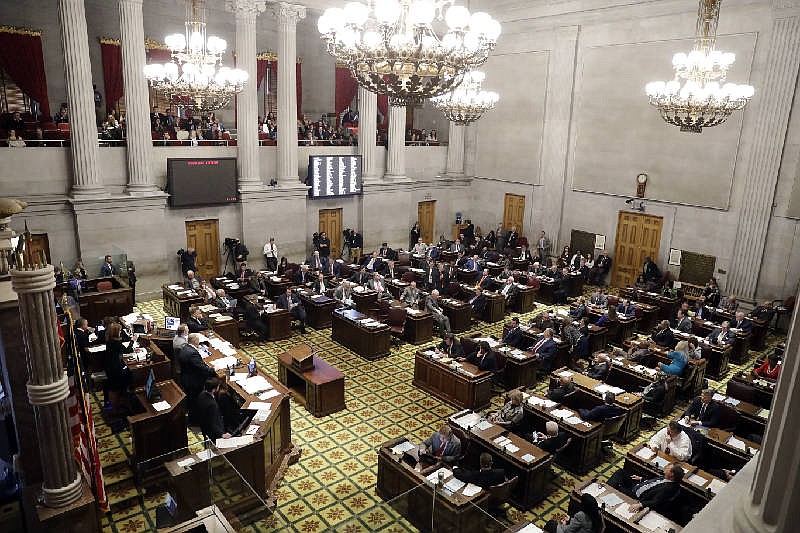NASHVILLE - The Tennessee House on Thursday approved a controversial bill requiring Gov. Bill Lee to seek a Trump administration waiver of Medicaid rules that could dramatically impact how much money the federal government provides to the $12 billion TennCare program.
Following a sometimes-testy debate, the GOP-led chamber approved the measure on a 68-21 party line vote with one Democrat voting present. A Senate committee is expected to take up a companion bill next week.
House Bill 1280 requires Lee to seek federal permission to convert federal funding for TennCare, which now covers some 1.25 million low-income pregnant women, children, the disabled and seniors, into a "block grant" system.
The block grant would provide the state with a set amount of federal money based on a per-person rate to spend on TennCare. In exchange, proponents say, the state would have more flexibility to allocate and spend allotted funds to address state needs. They say that would enable Tennessee to find cost savings.
Now, federal spending matches whatever a state spends on Medicaid based on the state's per capita income relative to the national average. In Tennessee, the federal government currently pays 65.87%, or around $7.5 billion, of TennCare's cost. If state spending goes up, federal spending does, too.
Critics charge the block grants, which the Trump administration is actively encouraging states to consider, could cut the safety net for some of Tennessee's most vulnerable residents. And, they warn, the shift could prove disastrous in an economic downturn or disease epidemic.
Rep. Timothy Hill, R-Bluff City, the bill sponsor, said the intent is to "return tax dollars to our citizens, reduce the cost of compliance and serve more people with existing dollars."
"The bottom line is we can do more with the 'Tennessee way,'" Hill said.
Republicans easily defeated an amendment offered by Democratic Caucus Chairman Mike Stewart of Nashville. It would also have required Lee to seek to expand TennCare to an estimated 280,000 low-income working adult men and women under the Affordable Care Act.
Voicing his desire that the program be expanded to include more children and other populations, Rep. G.A. Hardaway, D-Memphis, said, "I can't support legislation that's essentially going to destroy what we have now and put those with coverage at risk with the unknown."
Hill stressed that the motivation behind the bill "is not to cut services or cut folks from TennCare but to eliminate the costs of compliance."
As Democrats continued to raise concerns, Hill said if an agreement is reached between the Lee and Trump administrations, which he noted is possible given Trump and administration officials' openness to Medicaid block-grant waivers, "this body has final say-so, and that's the backstop to any concern."
Rep. Michael Curcio, R-Dickson, said the legislative intent is not to get fewer dollars from the federal government, and he doesn't believe that will happen. Flexibility will allow the state to "decide more pinpointed how we deploy those funds at the state level."
With some Democrats continuing to extend coverage to more people, Rep. Jason Zachary, R-Knoxville, said "Ladies and gentlemen, it is not the responsibility of government to cover every Tennessean. We provide opportunities."
The "Tennessee way," Zachary said, is "much better than the DC way."
Rep. Dwayne Thompson, D-Cordova, scoffed at the assertion, saying, "I'm not sure I would be bragging about almost one-tenth of our citizens without health care coverage."
Rep. Robin Smith, R-Hixson, told the chamber that 2018 political polling showed the No. 1 concern in elections was health care.
"And it wasn't health insurance. It was access to health care, meaning access to good quality care, access to reasonably priced care, access to care that was patient-driven and consumer focused. And [that's] what we're doing on this bill."
"We are doing health care the 'Tennessee Way,' where care is going to be about consumerism, it's going to be about access," Smith said. "We're going to prioritize rural care and we're also going to empower patients."
In a later interview, Lt. Gov. Randy McNally, the Republican Senate speaker, said Sen. Paul Bailey, R-Sparta, the bill sponsor in the upper chamber, and Majority Leader Jack Johnson, R-Franklin, plan to speak with Lee next week on an amendment to the waiver bill.
He declined to provide the amendment's details. But McNally earlier this year publicly discussed steps to ensure that any federal block grant waiver have provisions allowing it to grow annually based on enrollment growth and additional adjustments for inflation.
Asked about his views on a block grant waiver last month, Lee, a Republican, said, "We will only explore opportunities that work to serve Tennesseans in a greater way. If a block grant were such that we can tap it and provide more access, more coverage, more opportunities for folks to have access to coverage, then we'll do it. If not, then it won't be a good deal for Tennesseans.
"I'll be pursuing multiple opportunities," Lee added, "but only if they're good for us."
Contact Andy Sher at asher@timesfreepress.com or 615-255-0550. Follow him on Twitter @AndySher1.
